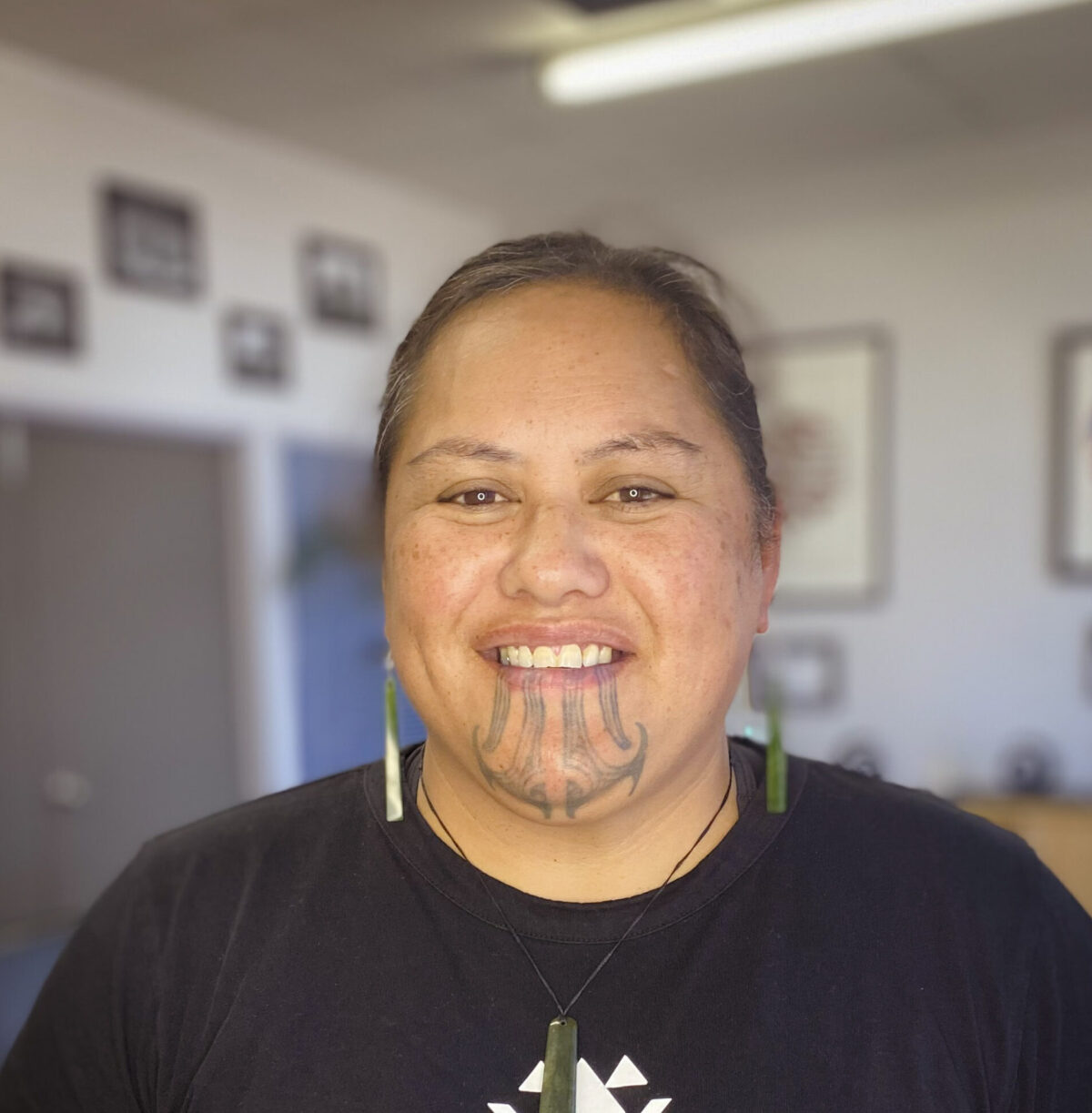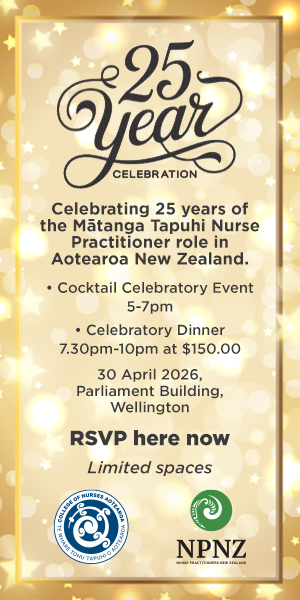Registered nurse prescriber Pirihira Puata fills out her scripts in te reo Māori and sends them off to pharmacies in South and West Auckland, and, she says, they love them.
Kei runga i ō rātou pakitara ko āna pānui whakaahua e whakamahuki ana i ngā whakamāoritanga, ā, ka whakahokia ngā rongoā e hiahiatia ana i te reo Māori ki ngā whānau e mātau ana ki tō tātou reo rangatira.
They have her posters on the wall with the translations and they send them back out to her in te reo Māori for the reo-speaking whānau.
Kua kōrero ia ki Kaitiaki Nursing New Zealand nō mua atu i Te Wiki o te Reo Māori e pā ana ki āna mahi tapuhi tūtohu e toa ana.
She spoke to Kaitiaki Nursing New Zealand ahead of Te Wiki o te reo Māori about her award-winning work as a nurse prescriber.
I mahi a Puata i roto i te umanga tapuhi neke atu i ngā tau 10, ā, e aroha ana ia i te mahi — engari i te tīmatanga i ngana ia kia whaiwāhi ki ngā tūranga hauora tuatahi auraki.
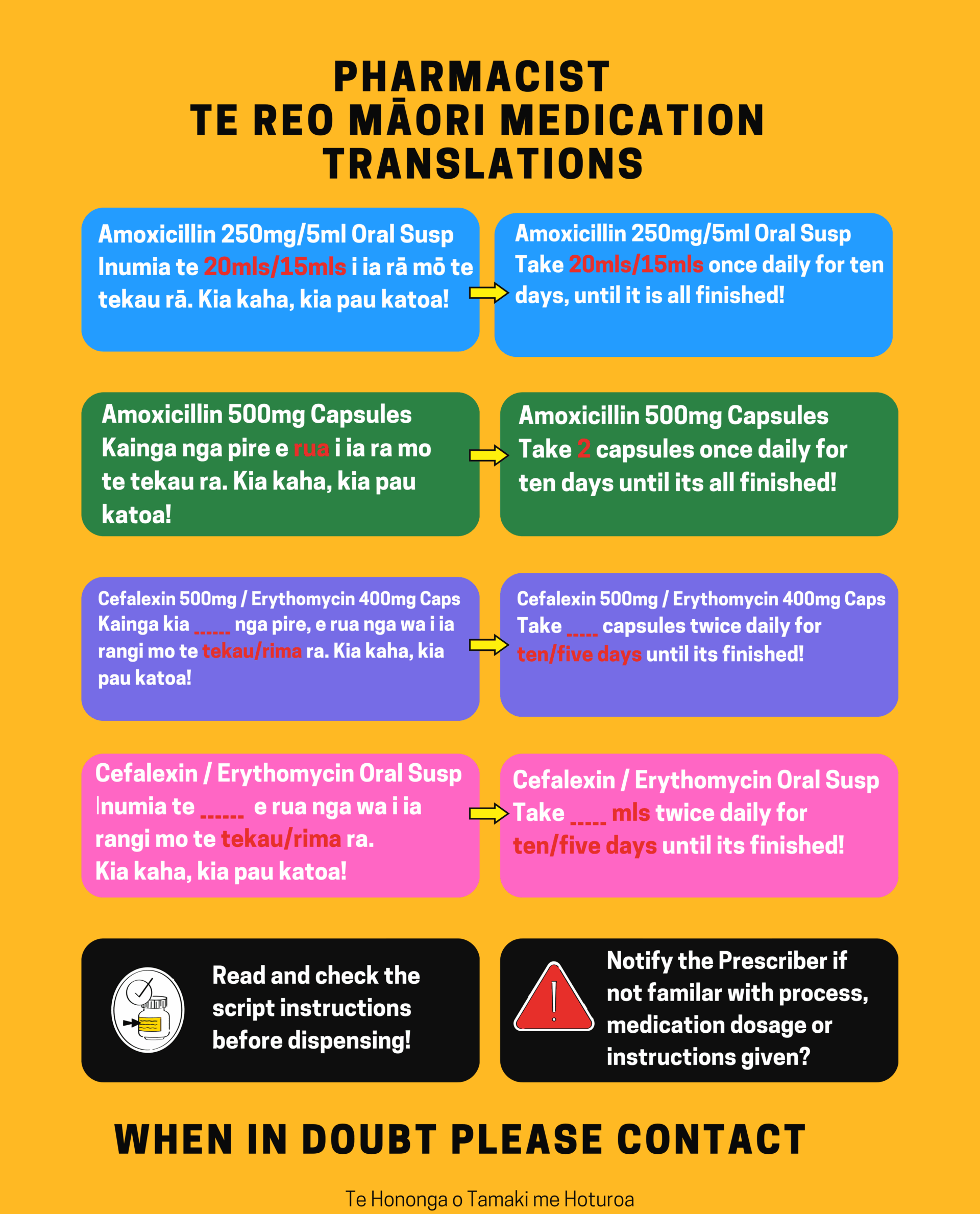
Puata has been nursing for 10 years now and she loves her work — but when she started out she made sure she worked in mainstream primary health.
Nā aua tūranga i tuku te āheinga ki te ako i ngā āhuatanga Pākehā i mua i tōna hokinga mai ki te ao hauora Māori kia whaihua ai āna taputapu hou.
It gave her an opportunity to learn Pākehā ways, before returning to Māori health and using the tools she’d learned there.
Kua tutuki ia i ngā ākoranga tapuhi tūtohu, ā, ināianei e mahi ana ia ki ngā umanga hauora Māori e rua — Te Puna Manawa i Tāmaki ki te Uru, i roto o ngā kura kaupapa Māori me ngā kōhanga; ā, ki Te Hononga o Tāmaki me Hoturoa hoki, i Tāmaki ki te Tonga, i roto i ngā kura auraki.
She became a registered nurse prescriber, and now works for two Māori health organisations — Te Puna Manawa, in West Auckland, working in reo-Māori immersion schools and kōhanga; and Te Hononga, in South Auckland, covering mainstream schools as well.
He mea nui rawa tōna āheinga kia tuku te kōwhiringa tapuhi tūtohu ki ngā hapori ki reira, hei tāna. Kei te whanga mai ngā tāngata i aua hapori ki ngā rata arowhānui mō ngā wiki maha. Engari e taea ana e Puata te tuku haumanu ki ngā tamariki i ngā kura me ō rātou whānau — i roto i tōnā hōkaitanga haumanu — kia tūraki i ngā tautika-kore o te hauora.
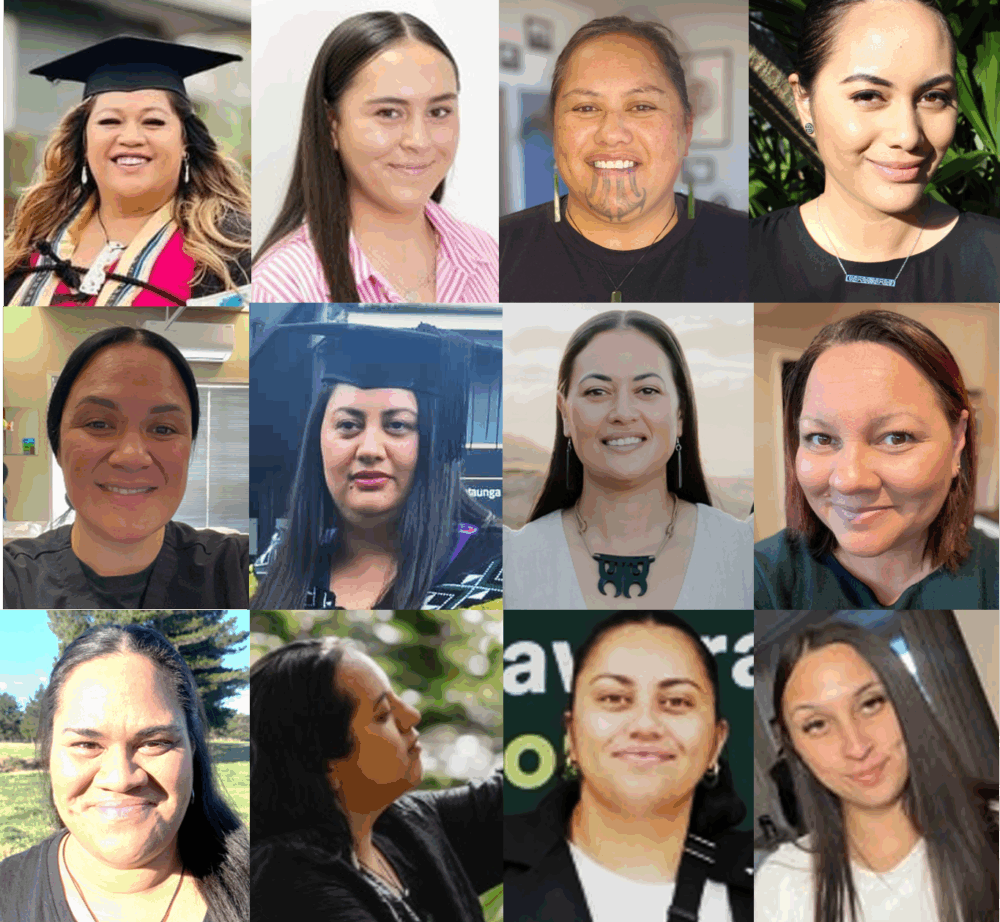
It was huge to be able to offer the nurse prescriber option to those communities, she said. People in those communities were waiting weeks to see a GP. But she could see the kids in their kura and offer treatment for them and their whānau – within her scope of practice – helping break down health disparities.
“Hei tapuhi tūtohu, i te whakaarohia, ka aha ahau . . . kia tohaina tō tātou reo ataahua ki ngā hapori auraki, inarā hoki ki ngā takiwā whare rongoā?”
“As a prescriber, I thought what can I do . . . to share our beautiful language with non-Māori, especially in these pharmacy spaces?”
Ināianei, ka tukuna ngā tūtohu i te reo ki ngā whare rongoā auau — ā, i ngā whakatakoto reorua hoki — e hāngai ana ki ngā pānui whakamahuki kua hanga ia mā rātou.
Now she delivers prescriptions to her regular pharmacies in te reo — and in bilingual format — that work with instructional posters she created for them.
“I te wā ko ngā whānau e whiwhi ana i taua rongoā, ā, ka kite rātou i ngā tūtohu i roto i te reo Māori, ā, ka whakaarohia ‘aē mārika, he whakamīharo’. E arohatia ana terā.”
“When whānau get that rongoā, that medicine, and they see it’s in te reo Māori, and they think ‘wow, this is amazing’. We love it.”

Ko ngā tamariki i ngā kura kaupapa — i tipu ake katoa i te reo — ka hikia te reo ki taumata kē.
The kids in kura kaupapa — immersed in the language their whole lives — took te reo to another level.
“Ka taea e rātou te wero i ahau i ētahi wā, nā te mea e tino matatau ana rātou . . . he tino teretere te kōrero . . . ka kī ahau ki a rātou ‘taihoa, taihoa, me āta haere tō kōrero, he aha te raru?'”
“Sometimes they can really challenge me because they’re such experts . . . the conversation is super fast . . . I have to say ‘whoa, whoa, you need to slow down, what’s the problem?'”
E arohatia ana nga tūtohu reorua e ngā kairongoā anō hoki, ka kī a Puata. “Ā, kei te mōhio rātou, i te wā ka puta mai te tūtohu, ka kīia e rātou ‘kaua e whāki mai, kei te mōhio ahau ki tēnei’. Engari, mehemea he pātai tā rātou, ka waea mai rātou ki ahau anō hoki.”
The pharmacists loved it too, Puata said. “And they know, when it comes through they go ‘don’t tell me, I know what this is’. But if they have any questions they always ring me as well.”
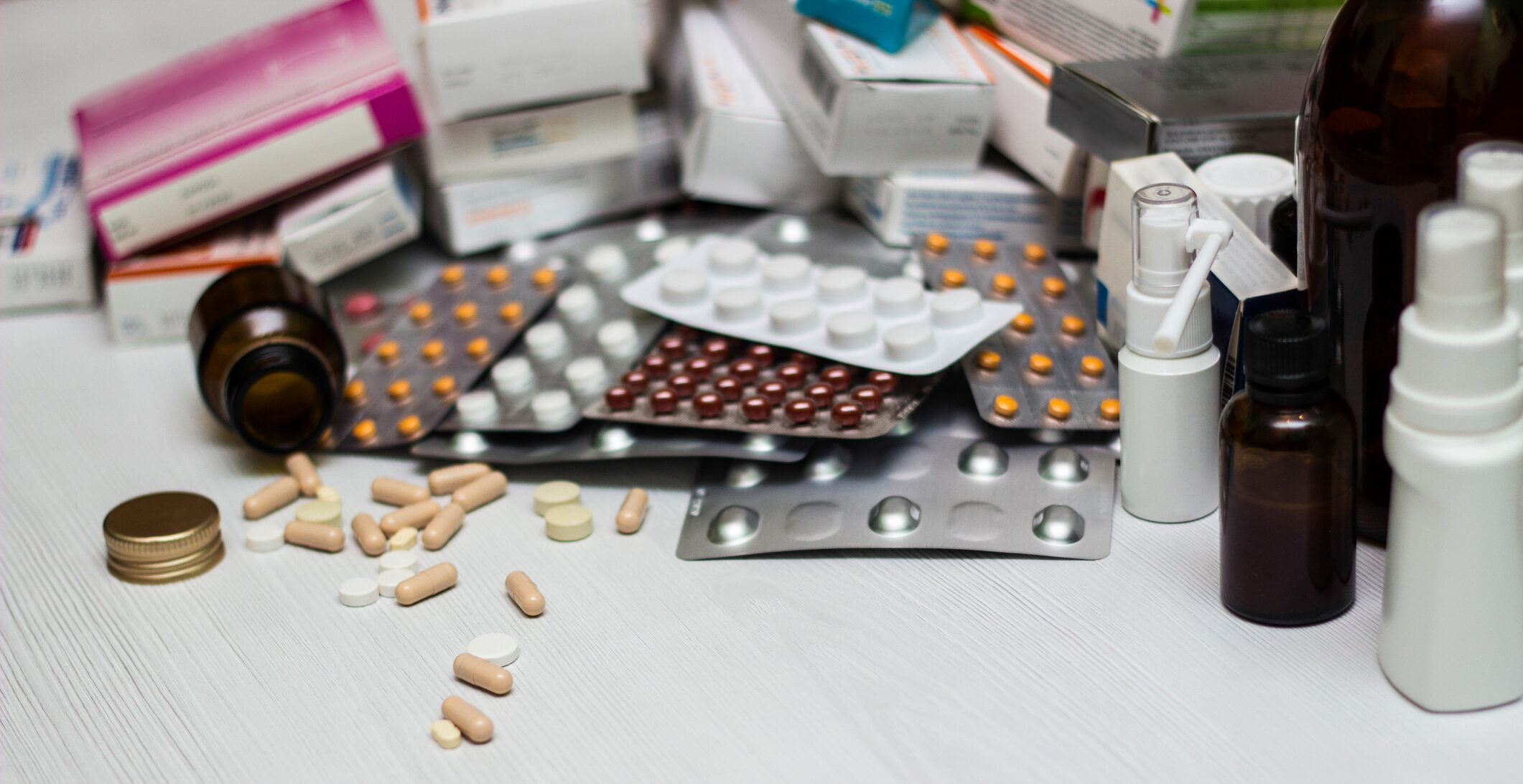
Kei te tino whakapono ia ki te tautoko i ngā nēhi Māori kia whai i te ara o te tapuhi tūtohu.
She loved prescribing, and was a really big believer in supporting Māori nurses to become nurse prescribers.
“I tēnei wā e taituarā ana ahau i ētahi o ngā tapuhi Māori nō Te Tai Tokerau i runga i a rātou ara kia tū hei tapuhi tūtohu i te hauora hapori.”
“At the moment I’m supporting some of the Māori nurses from Te Tai Tokerau on their pathway to become registered nurse prescribers in community health.
“Nā te mea, ko wai e tika ake nei kia tū hei tapuhi tūtohu i Te Nōta, i ō tātou tapuhi Māori?”
“Because who better to become prescribers in the Far North than our Māori nurses?”
He mīharo te kite i tā ngā tamariki kura kaupapa kuhu mai ki te umanga anō hoki, hei tāna. Engari he kupu āwhina ōna ki a rātou, i a rātou e whakapōtae ana.
It was incredible to see the kura kaupapa kids coming into the profession as well, she said. But she had some fairly firm advice to them when they graduated.
“E mea ana rātou ‘e Whaea Piri, ka hoki mai mātou ki te mahi i te marae’. Ā, ka kīia e au ‘e kāo. Kāhore. Ko tōku hiahia ka whakawhiti atu koutou ki te mahi auraki. Ko tōku hiahia, ki reira koutou e ako ana i ngā utauta a te Pākehā. Ko tōku hiahia, kia kuhu atu koutou ki aua wāhi, ā, kia werohia koutou anō. Kia whai wheako i aua wāhi, ā, tāria te wā ka hoki mai.”
“They said ‘Whaea Piri we’re going to come back and work at the marae’. And I said ‘no you’re not. No you’re not. What I want you to do is go over to mainstream. I want you to learn the tools of the Pākehā. I want you to go to those spaces, and get challenged. Get experience in those spaces and then when the time is right, then you come back.”
Kātahi “ka taea e au te tuku rākau” ki a rātou, hei tāna me te katakata hoki.
Then, she said with a laugh, they “can take over from me”.
Ko Puata tētahi o ngā nēhi Māori 12 i whakawhiwhia ngā tohu Te Pātaka Whaioranga (PHARMAC) Tapuhi Kaitiaki 2025.
Puata was one of 12 Māori nurses recognised at the 2025 Te Pātaka Whaioranga (PHARMAC) Tapuhi Kaitiaki Awards.



